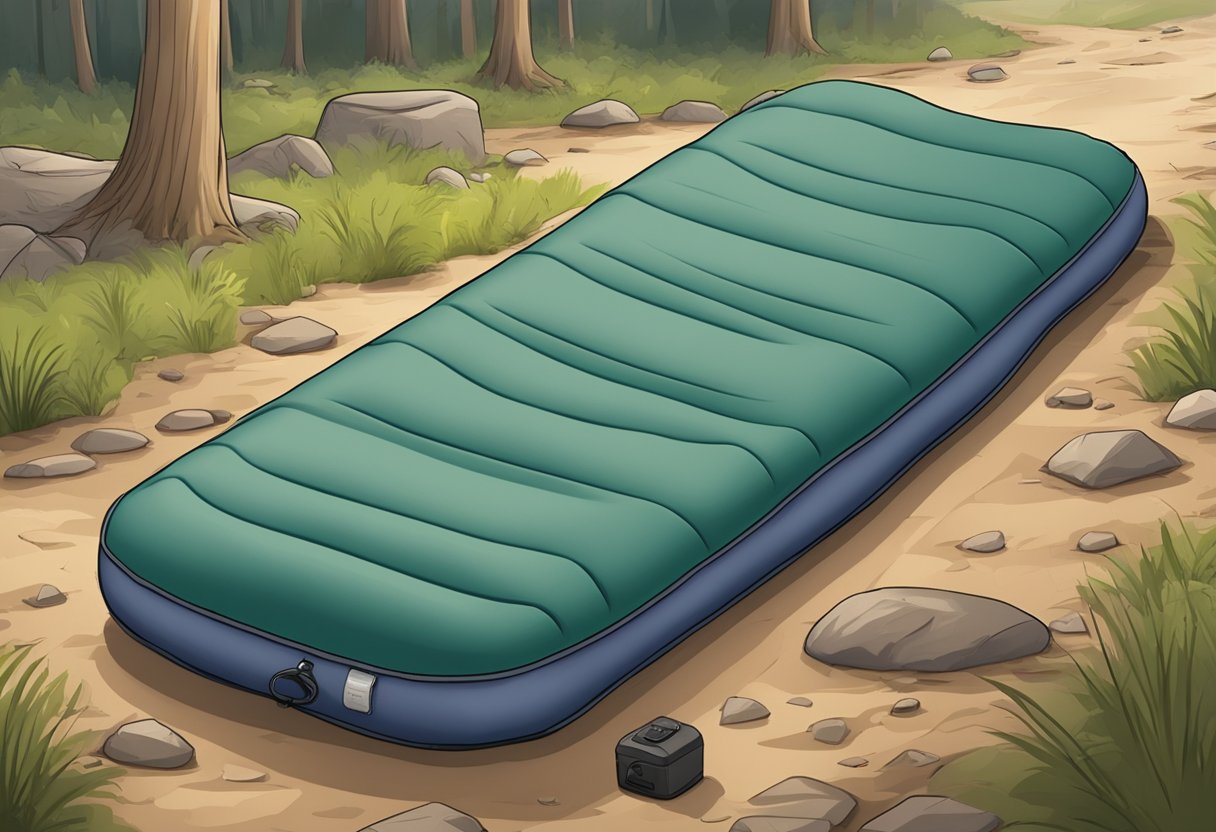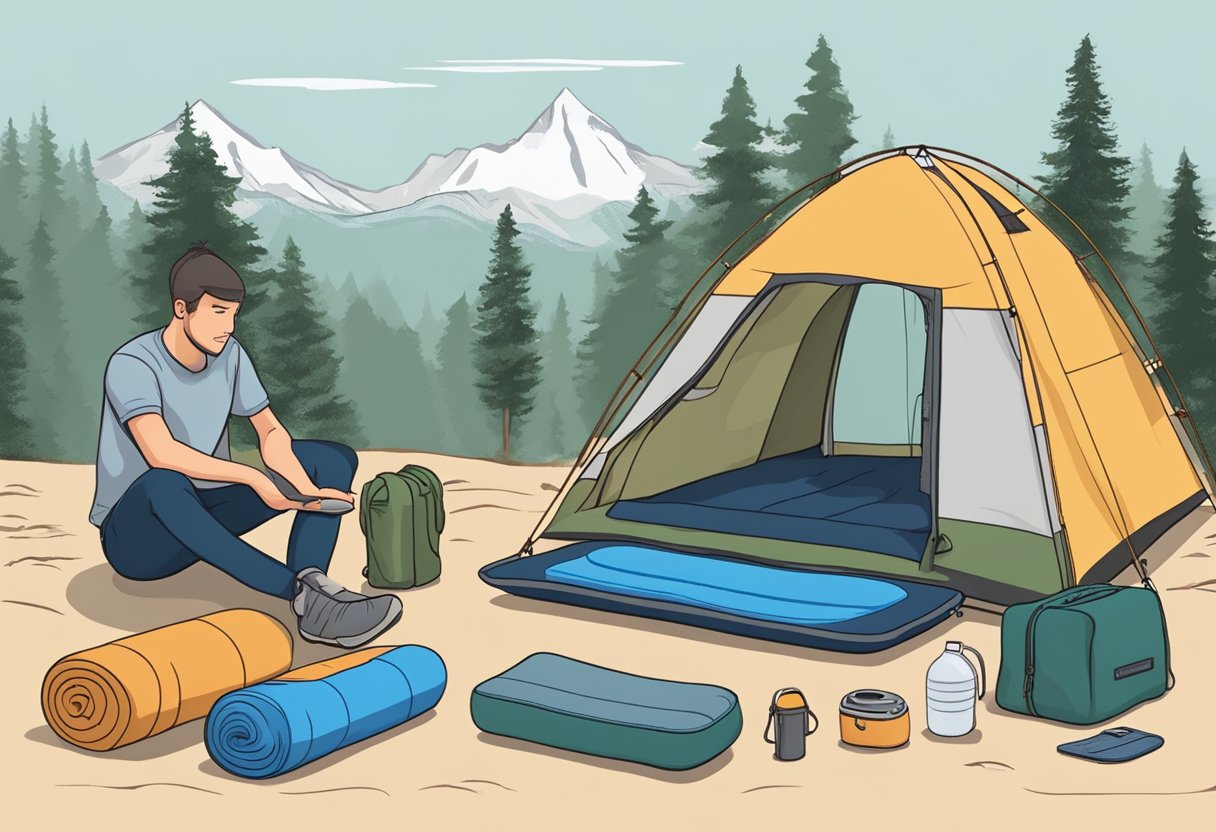If you’re planning a camping trip, you’ll need a comfortable place to sleep. There are two main options to choose from: sleeping pads and air mattresses. Both have their pros and cons, so it’s important to choose the right one for your needs.

Sleeping pads are lightweight and easy to pack, making them a great choice for backpacking trips. They come in a variety of shapes and sizes, so you can find one that fits your body type. Sleeping pads also provide insulation from the ground, keeping you warm on cold nights. On the other hand, air mattresses are more comfortable and provide a more bed-like experience. They’re great for car camping trips where weight and size aren’t an issue. However, they can be bulky and difficult to pack. Additionally, they can be punctured, leaving you without a place to sleep.
Ultimately, the choice between a sleeping pad and an air mattress comes down to personal preference and the type of camping trip you’re planning. In this article, we’ll explore the pros and cons of each option to help you make an informed decision.
Understanding Camping Sleep Systems
When it comes to camping, choosing the right sleep system is crucial for a good night’s rest. Two popular options are camping sleeping pads and air mattresses. In this section, we’ll explore the types of sleeping pads and air mattress essentials to help you make an informed decision.
Types of Sleeping Pads
Camping sleeping pads come in three main types: foam, self-inflating, and inflatable. Foam pads are the most basic and affordable option. They are made of closed-cell foam and offer good insulation but are less comfortable than other options. Self-inflating pads have a foam core that expands when you open the valve. These pads are more comfortable than foam pads and offer good insulation. Inflatable pads are the most comfortable option and come in various thicknesses and materials. They are easy to inflate with a pump or by mouth, but they are less durable than foam or self-inflating pads.
Air Mattress Essentials
Air mattresses are a popular choice for car camping. They come in various sizes and thicknesses and offer a comfortable sleeping surface. When choosing an air mattress, consider the size, weight, and durability. Look for a mattress that is easy to inflate and deflate and comes with a pump. Keep in mind that air mattresses are bulkier and heavier than sleeping pads, so they are not ideal for backpacking or wilderness camping.
In summary, when choosing between a camping sleeping pad and an air mattress, consider portability, ease of use, cost, comfort, and intended use. A sleeping pad is lightweight and portable, making it ideal for backpacking and wilderness camping. An air mattress offers convenience and comfort, making it suitable for car camping.
Comfort and Insulation Comparison

When it comes to camping, comfort and insulation are two of the most important factors to consider in your sleep system. Let’s take a closer look at how sleeping pads and air mattresses compare in terms of these features.
Sleeping Pad Comfort
Sleeping pads are typically more comfortable than air mattresses due to their ability to conform to your body shape. They come in a variety of thicknesses and materials, allowing you to choose the level of cushioning and support that works best for you. In addition, sleeping pads are designed to be firm enough to provide support while still being comfortable enough to sleep on. This is especially important for side sleepers who need extra cushioning for their hips and shoulders.
Air Mattress Warmth
When it comes to warmth, air mattresses may not be the best choice. They are typically less insulated than sleeping pads and may not provide enough thermal resistance to keep you warm on cold nights. However, they do offer the advantage of being able to adjust the firmness to your liking, which can be helpful for those who prefer a firmer or softer sleeping surface.
To compare the insulation of sleeping pads and air mattresses, you can look at the R-value. The R-value measures the thermal resistance of a material, with higher values indicating better insulation. Sleeping pads typically have higher R-values than air mattresses, making them a better choice for colder weather camping.
In summary, when it comes to comfort and insulation, sleeping pads are typically the better choice for camping. They provide better cushioning, support, and insulation than air mattresses, making them a more comfortable and warm option for a good night’s sleep in the great outdoors.
Portability and Convenience

When it comes to camping gear, portability and convenience are two key factors that can make or break your camping experience. In this section, we’ll take a closer look at how camping sleeping pads and air mattresses compare in terms of portability and convenience.
Weight and Packability
One of the biggest advantages of camping sleeping pads is their lightweight and compact design. Most sleeping pads are made of lightweight materials like foam or air, which make them easy to pack and carry. In fact, some sleeping pads can be rolled up to the size of a water bottle, making them incredibly easy to pack and store in your backpack.
On the other hand, air mattresses tend to be bulkier and heavier than sleeping pads. While some air mattresses can be compressed down to a relatively small size, they still take up more space in your backpack than a sleeping pad. Additionally, air mattresses require a pump to inflate, which adds extra weight to your gear.
Ease of Inflation/Deflation
Another factor to consider when comparing camping sleeping pads and air mattresses is ease of inflation and deflation. Sleeping pads are typically very easy to inflate and deflate – many models come with built-in air pumps or can be inflated with just a few breaths. Deflating a sleeping pad is just as easy – simply open the valve and roll it up.
Air mattresses, on the other hand, can be more challenging to inflate and deflate. Most air mattresses require a separate pump, which can be time-consuming and cumbersome to use. Additionally, air mattresses can be difficult to deflate and pack up – you’ll need to carefully fold or roll the mattress to remove all the air.
Overall, camping sleeping pads are generally more portable and easier to use than air mattresses. If you’re looking for a camping sleep solution that is lightweight, compact, and easy to set up, a sleeping pad is the way to go.
Durability and Maintenance

When it comes to camping gear, durability is a crucial factor to consider. You want your gear to last for multiple trips, and you don’t want to be stuck with a broken or leaky item in the middle of nowhere. Both sleeping pads and air mattresses have their strengths and weaknesses in terms of durability and maintenance.
Sleeping Pad Resilience
Sleeping pads are generally more resilient than air mattresses. They are designed to be used on rough terrain and withstand the wear and tear of outdoor activities. They are made of sturdy materials such as foam or PVC, which can withstand punctures and rough handling. Foam pads are particularly durable and can last for years with proper care.
One of the main advantages of sleeping pads is that they do not require an air pump to inflate. This means that there are no parts that can break or malfunction, making them more reliable in the long run. Manual inflatable pads and self-inflating pads are also available, but they require more maintenance and can be more prone to leaks.
Air Mattress Vulnerabilities
Air mattresses are generally less durable than sleeping pads. They are more vulnerable to punctures and leaks, which can render them unusable. They are also more complex, with multiple parts such as air pumps that can malfunction or break. This means that air mattresses require more maintenance and can be less reliable in the long run.
However, air mattresses have their advantages as well. They are more comfortable than sleeping pads and provide a more bed-like experience. They are also easier to set up and take down, making them a good option for car camping. Some air mattresses are designed with durability in mind, with features such as reinforced seams and thicker materials.
In conclusion, both sleeping pads and air mattresses have their strengths and weaknesses in terms of durability and maintenance. Sleeping pads are generally more resilient and reliable in the long run, while air mattresses are more comfortable and easier to set up. It’s up to you to decide which one is the best fit for your camping needs.
Cost-Benefit Analysis

When it comes to choosing between a camping sleeping pad and an air mattress, the cost-benefit analysis is an important factor to consider. Here’s what you need to know:
Investment Value
Air mattresses tend to be more expensive than sleeping pads, especially if you opt for a higher-end model. However, they do offer a more luxurious sleeping experience, with many models featuring built-in pumps, pillow tops, and other amenities. If you’re looking for a high level of comfort and are willing to invest in it, an air mattress might be the way to go.
On the other hand, sleeping pads are generally more affordable, making them a great option for budget-conscious campers. While they may not offer the same level of luxury as an air mattress, they do provide a comfortable sleeping surface that can help you get a good night’s rest.
Long-Term Value
When it comes to long-term value, sleeping pads tend to come out ahead. They are generally more durable than air mattresses, which can be punctured or leak over time. Additionally, sleeping pads are typically more compact and lightweight, making them easier to pack and transport.
While air mattresses may offer a more luxurious sleeping experience, they can be bulky and heavy, making them less practical for backpacking or other types of camping where weight and space are at a premium. If you’re looking for a long-term investment that will provide value for years to come, a sleeping pad is likely the better choice.
In summary, the cost-benefit analysis of camping sleeping pads vs air mattresses comes down to your individual needs and preferences. If you’re looking for a high level of comfort and are willing to invest in it, an air mattress might be the way to go. However, if you’re looking for a more affordable and practical option that will provide long-term value, a sleeping pad is likely the better choice.